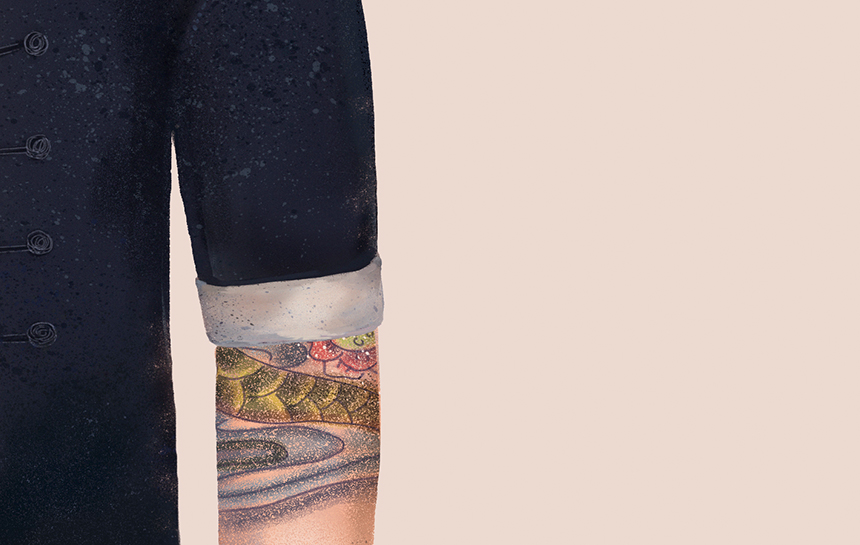China’s tattoo culture has undergone a remarkable transformation in recent years. Tattoos, once seen as a mark of deviancy and rebellion, have now become a popular form of self-expression and a symbol of individuality among Chinese millennials. This shift is particularly evident in cosmopolitan cities like Shanghai, which has been dubbed the “tattoo mecca” of China. In this article, we will explore the changing attitudes towards tattoos in Chinese society and the growing popularity of Chinese culture tattoos.
Table of Contents
ToggleEmbracing Individuality: A Cultural Shift
Traditionally, tattoos were stigmatized in Chinese culture, dating back thousands of years to the times of Confucius. The sanctity of the body was highly valued, and tattoos were seen as a defilement of this ideal. Over time, tattoos also became associated with criminality and shame. However, as China’s younger generations shed these centuries-old prejudices, tattoos have become a means of self-expression and a way to challenge societal norms.
According to Zhuo Danting, a renowned tattoo artist based in Shanghai, the number of tattoo parlors in the city has skyrocketed in the past decade. There were only a handful of tattoo studios in Shanghai in 2007, but today there could be as many as 4,500, with an estimated 300,000 nationwide. Tattoos have become an everyday sight on the streets of China, with Shanghai leading the way in embracing this form of art.
Chinese Culture Tattoos: A Way to Reconnect
The resurgence of Chinese culture tattoos is not just a reflection of changing attitudes towards body art but also a desire to reconnect with traditional Chinese heritage. Tattoo artists like Gang Shao have observed a growing interest among their clients in designs inspired by traditional tales and the Chinese zodiac. This trend represents a “homecoming” for Chinese millennials who are reclaiming and embracing their cultural roots.
Moreover, tattoos have become a symbol of privilege and status for young Chinese. Wealthy millennials, in particular, are willing to pay top dollar for high-quality tattoos by renowned artists like Zhuo Danting. Just as luxury brands like Gucci are status symbols, tattoos have become a way for the younger generation to display their wealth and taste.
Challenges and Controversies
Despite the growing acceptance of tattoos in Chinese society, there are still challenges and controversies surrounding this form of self-expression. Some employers, especially in more traditional industries, still frown upon visible tattoos and may even discriminate against employees with ink. The Chinese government has also expressed concerns about what it deems as a rise in “dispirited culture” among the youth.
In 2018, the government issued a directive banning musicians and actors with tattoos from appearing in the media. Social media platforms like Weibo also removed content featuring tattoos and hip-hop culture. Soccer players were not spared either, with regulations stipulating that professional players must have “no visible ink.” These actions have received criticism from the younger generation, who view them as a sign of conservative thinking.
The Future of Chinese Culture Tattoos
Despite the challenges and controversies, the tattoo community remains optimistic. Many artists believe that the government’s attempt to crack down on tattoos will only spur more discussion and engagement, ultimately benefiting the industry. Additionally, there is growing support among tattoo artists for increased government oversight to regulate the industry and improve safety standards.
As Chinese society continues to evolve, tattoos are becoming more accepted and celebrated as a legitimate form of self-expression. The younger generations, unburdened by the cultural stigmas of the past, are embracing tattoos as a way to assert their individuality and reconnect with their cultural heritage. With time, it is hoped that tattoos will be fully embraced and recognized as a legitimate art form in Chinese society.
Frequently Asked Questions
Q: Are tattoos still stigmatized in Chinese society?
A: While attitudes towards tattoos have shifted in recent years, there are still pockets of society, particularly among the older generation, that harbor negative views towards tattoos. Some employers and institutions may also have policies that discriminate against visible tattoos.
Q: Is there a growing interest in Chinese traditional tattoos among millennials?
A: Yes, many young Chinese individuals are embracing Chinese culture tattoos as a way to reconnect with their heritage. Traditional designs inspired by Chinese folklore and the Chinese zodiac are particularly popular.
Q: What challenges do tattoo artists face in China?
A: Tattoo artists in China face challenges such as increased competition and the proliferation of low-quality tattoo studios. Many artists welcome government oversight to improve industry standards and ensure the safety of clients.
Conclusion
The rise of Chinese culture tattoos reflects a cultural shift among Chinese millennials who are embracing self-expression and challenging societal norms. Tattoos have become a means to reconnect with traditional Chinese heritage and a symbol of individuality. While there are still challenges and controversies surrounding tattoos in China, the tide is turning, and tattoos are emerging as a legitimate art form in Chinese society. As the younger generation continues to assert their individuality, it is hoped that tattoos will be fully accepted and celebrated in all aspects of Chinese culture. For those interested in exploring Chinese culture tattoos, TKTX Numbing Cream Store offers a range of numbing creams to enhance the tattooing experience.






